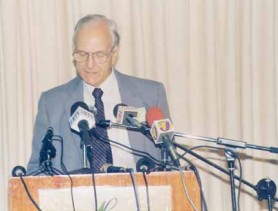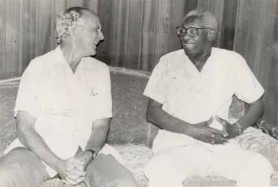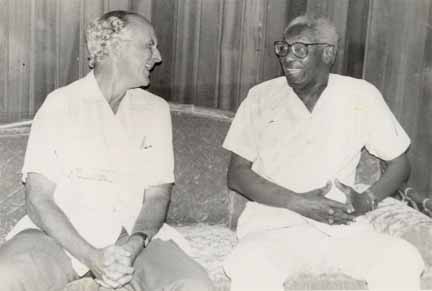(Excerpt from a speech in Antigua, May, 2002)
There is no Freedom of Information legislation in Guyana. President Bharrat Jagdeo has said that he is not opposed in principle to such legislation but there is already a long list of laws to be drafted and promulgated and this is not a priority. The government has a good record on holding press conferences and being available to answer questions. Reporters also have access to meetings of Parliament and at City Hall but there can be no doubt that a Freedom of Information Act would be a valuable tool in formalising the right of access to certain types of public information.

The Federal Supreme Court decision in Sullivan vs New York Times was submitted as an authority by my then legal partner Mr Miles Fitzpatrick in a case in our Appeal Court in which he represented Fr Andrew Morrison, then editor of the Catholic Standard, who had been sued for damages for libel by a government minister. He noted that both American and Guyanese case law originated from the English common law and that there was a constitutional right of free expression, as there was in America, and he urged the court to adopt the progressive principle laid down in Sullivan that a public figure could not succeed in a libel action unless it was established that not only was the statement untrue but it was published knowing it to be untrue or recklessly careless whether it was true or false. The court did not uphold the submission.
There have been developments in the case law in England and Australia and other common law jurisdictions that hold out some hope but as far as I am aware no Caribbean court has as yet applied the Sullivan principle. It did, however, form part of submissions made by some newspaper publishers to the Standing Committee of Ministers responsible for Legal Affairs in the Caribbean in January 1997 proposing amendments to the law of libel. That committee subsequently decided to retain a consultant to advise on this and other matters but due to budgetary constraints was unable to proceed.
Acceptance of the Sullivan principle either by judicial decision or by legislative amendment would certainly encourage more robust coverage by the media of the activities of politicians and public officials and is I believe in the public interest. The English courts have tended to be conservative on this issue and our judges have not been prepared so far to strike out boldly.

Our constitution gives us the right to free expression. At one stage, a licence was needed to import newsprint, and many other items. When the Mirror newspaper was refused a licence it challenged this. The Appeal Court dismissed its claim, wrongly I believe, because it held that the need for licensing was primarily due to a shortage of foreign exchange and so this law was not a direct encroachment on the constitutional right of freedom of expression though it might have had the indirect effect of interfering with that right. Licences are no longer required.
Publishers are of course subject to the laws of libel and sedition.
The Newspaper Publications Act requires that certain declarations be filed and a bond in the sum of $5,000 be lodged, but this is not seen to be unreasonable; indeed it has been argued that it gives little protection to persons injured by libellous publications.
At present the state still maintains a radio monopoly but the government has indicated this will be changed as soon as new broadcasting legislation is introduced.
A law was unanimously passed before the last elections making the publication or broadcasting of racially inflammatory statements a crime. That could be dangerous depending on how the words were interpreted by the court, but there was strong public support for this measure given the kind of statements that were being broadcast on some television stations. In fact the law proved to be a dead letter as no prosecution was ever filed though the provisions of the law are frequently and flagrantly breached on talk shows and other programmes.
Libel actions are of course a problem, especially given the substantial legal costs involved in defending them even where there is little merit in the claim.
Our Defamation Act provides that a defence of fair comment shall not fail by reason only that the truth of every allegation of fact is not proved if the expression of opinion is fair comment having regard to such of the facts alleged or referred to in the words complained of as are proved. The same qualification applies to the plea of justification.
One suspects that it will not be easy to persuade governments in the region to shift the burden of proof from the media defendant and it would be hard to support this except in the case of public figures, which is essentially what Sullivan has done, as the media defendant is only liable in such cases where there is malice.

